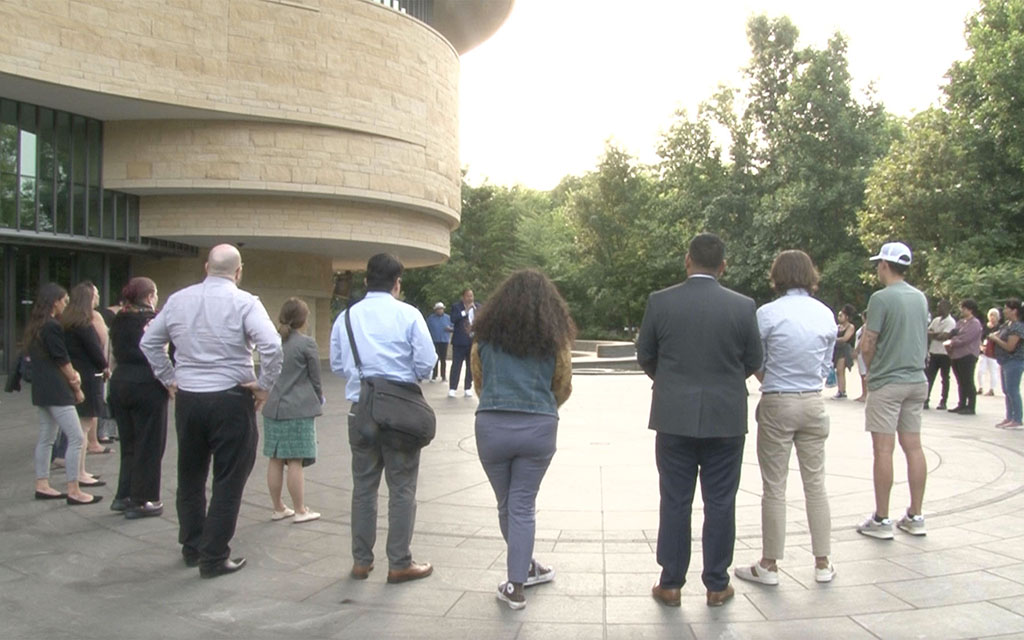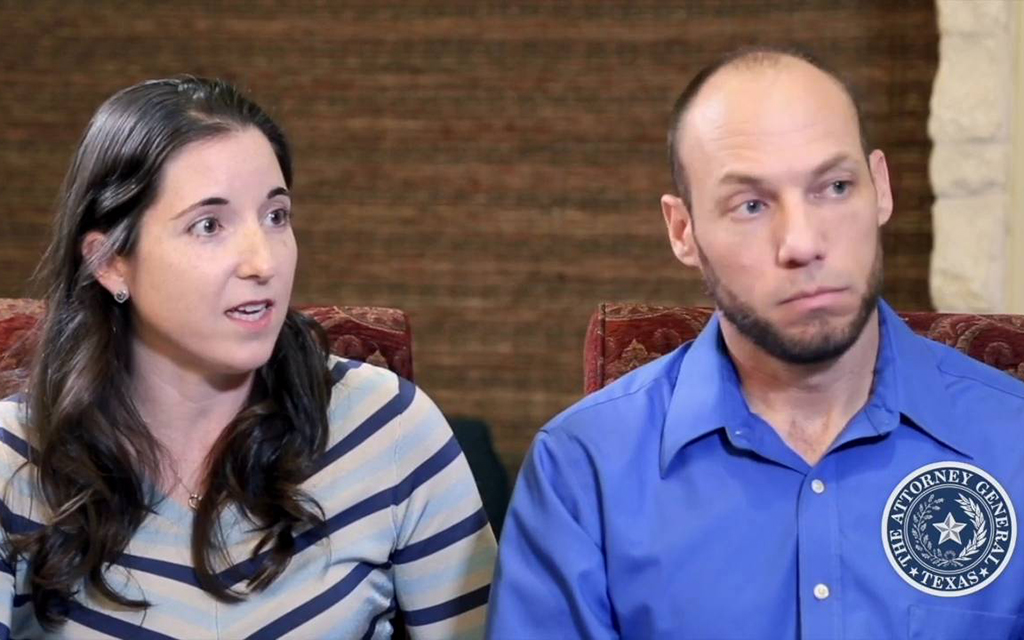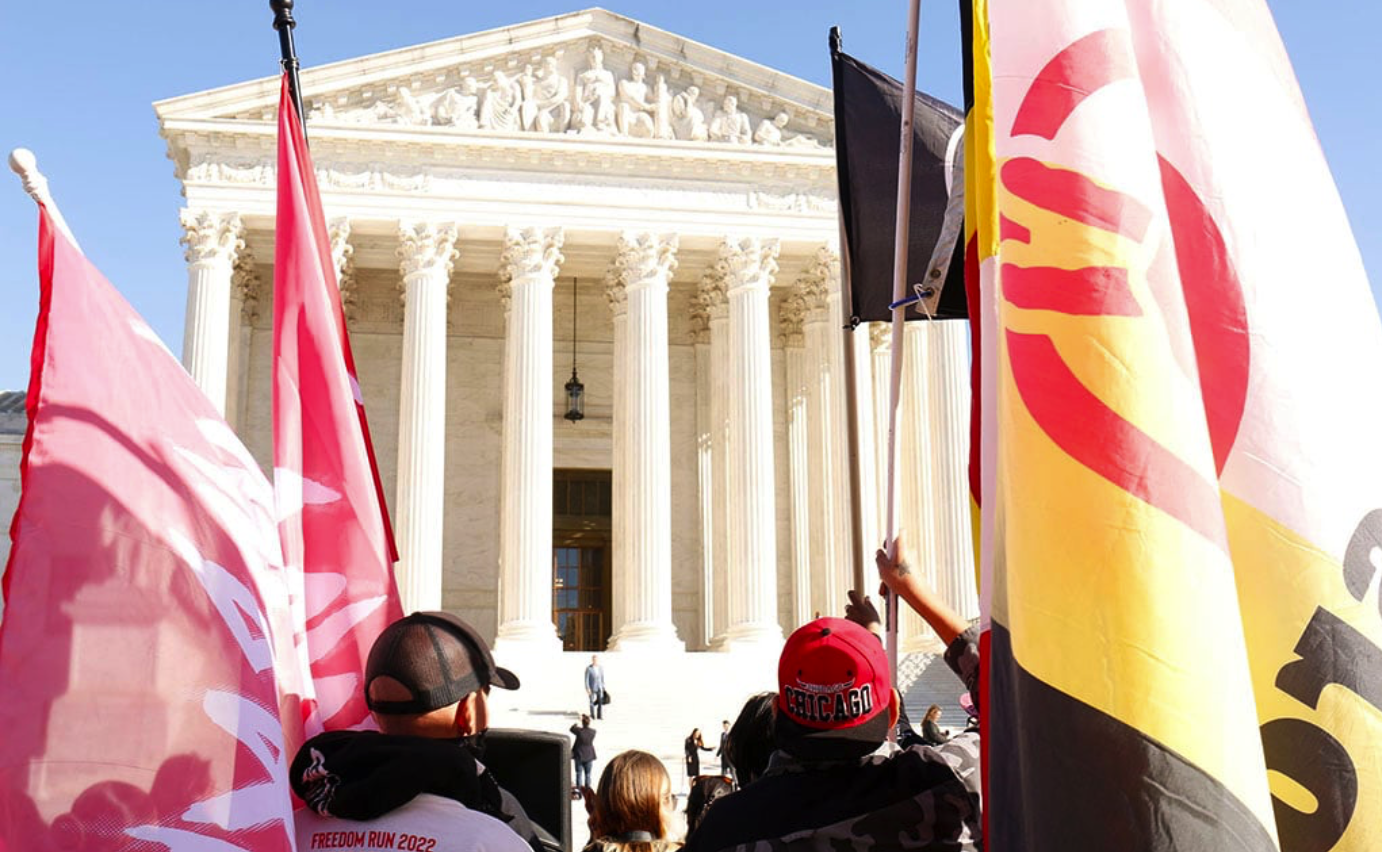Protesters held flags of different tribal nations and various Indigenous groups outside the Supreme Court in November, when justices listened to more than three hours of arguments on the Indian Child Welfare Act. They upheld the law Thursday in a 7-2 ruling. (File photo by Ryan Knappenberger/Cronkite News)
Jasmine Kabiri/Cronkite News
June 15, 2023
WASHINGTON – The Supreme Court on Thursday upheld a federal law that requires tribal families get priority in the adoption or foster placement of an Indigenous child, a law aimed at stopping what one justice called the “nightmare” of family separation.
Advocates have called the Indian Child Welfare Act the gold standard of child welfare laws, but it was challenged by three families and the state of Texas, which claimed the law stepped on state’s rights and unlawfully uses race to keep non-Native families from adopting Native children.
But the justices, in a 7-2 ruling, upheld the 1978 law in what advocates called a “win for tribal sovereignty.”
“The issues are complicated,” Justice Amy Coney Barrett wrote in the opinion for the court. “But the bottom line is that we reject all of petitioners’ challenges to the statute, some on the merits and others for lack of standing.”
In separate dissents, Justices Samuel Alito and Clarence Thomas said the law “treads on state authority over family law,” one of the main complaints of opponents.

ICWA supports gather outside the National Museum of the American Indian Thursday to celebrate the Supreme Court’s decision upholding the law. (Photo by Isabel Garcia/Cronkite News)
In a concurring opinion, Justice Brett Kavanaugh pointed out that the court did not address one of the opponents’ other complaints – that the racial elements of the ICWA raise equal protection concerns.
“In my view, the equal protection issue is serious,” Kavanaugh wrote, noting that a Native child may be denied the most appropriate placement based on his or her race, or a prospective foster or adoptive parent may be denied the chance to take in a child because of the would-be parent’s race.
Walter Olson, a senior fellow at the Cato Institute, said the fact that Kavanaugh cited racial discrimination in his concurrence could signal future challenges to the law. Olson said he cautions the law’s supporters “not to treat this as confirming that ICWA is intact,” since the ruling did not address constitutional questions about the law.
He was echoed by a statement from the Goldwater Institute, which opposes the ICWA.
“While it’s shameful that the Court would turn a deaf ear to the cries of our country’s most at-risk children, it is at least gratifying that the Court left open the door to future lawsuits challenging the race-based injustices caused by ICWA,” the Goldwater statement said.
But Native American advocates disagreed. American Civil Liberties Union staff attorney Crystal Pardue said Thursday’s ruling “has settled the uncertainty around whether it was constitutional.”
RELATED STORY

Supreme Court hears Navajo water rights case with potentially big impact
Ian Gerhsengorn, an attorney who argued the case before the court in November on behalf of tribe supporting the law, said that the impact of the court’s ruling is already being felt.
“I’ve already gotten emails from people in Indian Country saying this is making a real difference in court filings and family placements,” Gershengorn said during a celebration Thursday afternoon outside the National Museum of the American Indian.
Enacted in 1978, the ICWA was Congress’ response to “an alarmingly high percentage of Indian families are broken up by the removal, often un warranted, of their children from them by nontribal public and private agencies.”
The law compels states to place a tribal child – or a child with a tribal parent or a child who is eligible for tribal membership – with a tribal family whenever possible. If an adoptive or foster family in the child’s own tribe is not available, the next placement would be with a family in another tribe.
The law also gives tribes the right to intervene in a child’s placement, even against the wishes of the biological parents.
The law was challenged by three white families who were initially denied the right to adopt or take in an Indigenous child as a foster placement. The state of Texas joined their challenge, claiming the law intruded on its rights to run its child welfare system.
Their suit also argued that ICWA was unconstitutional because its adoption provisions denied them equal protection – a 14th Amendment clause prohibiting discrimination.
A U.S. District Court in Texas in 2018 agreed with the white families, but that decision was partly reversed by the 5th U.S. Circuit Court of Appeals. Both sides appealed, and the case was heard by the Supreme Court in November.

Jennifer and Chad Brackeen, the Texas couple whose fight to adopt a Navajo child sparked the legal challenge to ICWA that led to Thursday’s ruling. (Photo courtesy Texas Attorney General’s Office)
The justices upheld those parts of the circuit court ruling that preserved the law. It said that the families and Texas did not have standing to raise the equal protection claims and it ordered the circuit court to dismiss that part of the case.
“Our prayers have been answered with today’s ICWA ruling from the Supreme Court,” Navajo Council Speaker Crystalyne Curley said in a prepared statement Thursday.
“It’s been a long hard-fought battle on the legal end and in the hearts and minds of Indigenous children and families across the country,” her statement said. “Our families, leaders, and advocates remained united and persevered throughout this legal challenge.”
The ACLU’s Pardue said the next step is for states to introduce their own version of ICWA; Arizona is one of 38 states without one implemented.
The ruling was also welcomed by lawmakers, who said ICWA is still necessary in light of the nation’s shameful history of forced assimilation.
“Keeping Native children in their own communities with access to their traditional languages and cultures is critical to addressing the intergenerational trauma that this country forced upon Indian Country for far too long,” said Rep. Raul Grijalva, D-Tucson.
-Cronkite News reporter Isabel Garcia contributed to this report.








